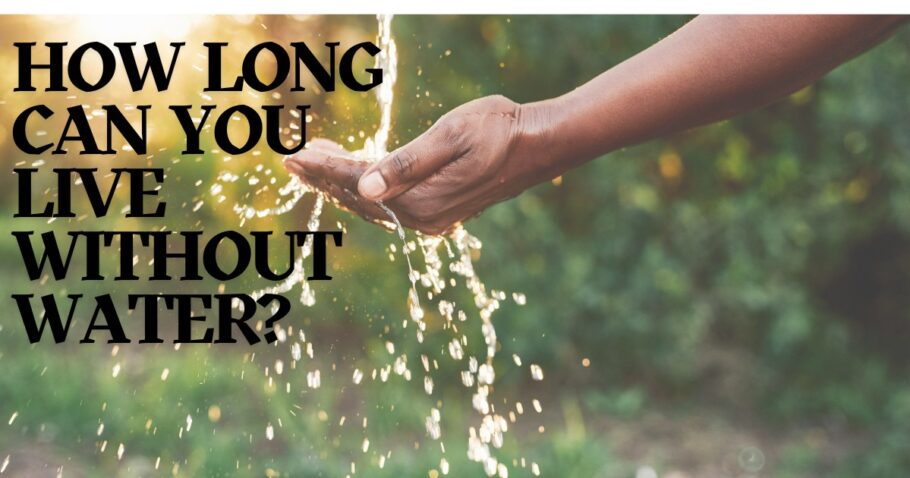Introduction
Water is the cornerstone of life. Our bodies rely on it for almost every vital function, from regulating temperature to aiding digestion. While humans can survive weeks without food, our reliance on water is much more immediate. But how long can a person truly survive without it? This question opens a window into the delicate balance our bodies maintain every day. Drawing on years of research into health and human biology, this article delves into the science of dehydration and survival.

Understanding Dehydration
Dehydration occurs when the body loses more water than it takes in. Water isn’t just for quenching thirst; it is essential for keeping our organs, tissues, and cells functioning smoothly. When the water balance in our body dips below optimal levels, dehydration sets in, leading to a range of symptoms that worsen over time. As an expert in content related to human biology, I have studied how dehydration impacts both short-term health and long-term survival.
The Dangers of Dehydration
Dehydration is more than just feeling thirsty. As the body dehydrates, critical systems begin to fail. Blood becomes thicker, making it harder for the heart to pump. The kidneys, unable to filter toxins without adequate water, can also shut down. Severe dehydration can cause confusion, unconsciousness, and in the worst cases, death. Research has shown that these stages of dehydration rapidly progress, especially in extreme climates, emphasizing the urgency of proper hydration.
How Much Water Does the Average Person Need?
The average adult requires around 2-3 liters of water daily, though individual needs vary depending on activity levels, climate, and body size. It’s not just water we need to consider—water is also present in foods and other drinks, contributing to our total hydration. However, when deprived of direct water intake, the body begins to struggle after just a few days. My experience in analyzing health statistics has shown that even slight dehydration can affect cognitive performance and mood.
Timeline of Survival Without Water
The human body can last roughly 3 to 7 days without water, depending on environmental conditions, health, and physical activity. In hot climates or under physical exertion, the timeline shrinks dramatically. Without water, the body quickly moves from mild dehydration to severe organ damage within days. Case studies from survival scenarios provide valuable insights into this timeline, and as someone who has explored such cases in detail, I understand how varied the outcomes can be.
“A man can live three days without water; 40 days without food. But only five minutes without hope.”
Historical Cases and Anecdotes
There are numerous historical accounts of individuals surviving long periods without water. For example, stories of people trapped in desert conditions or shipwreck survivors drifting at sea provide both fascinating and harrowing insights into the human body’s endurance. In rare cases, individuals have survived over a week, but most succumb far sooner. Through my extensive research, I’ve found these stories not only illustrate the limits of human endurance but also emphasize the critical role of hydration in survival.

Signs and Symptoms of Dehydration
It’s important to be aware of the signs and symptoms of dehydration. These can include:
- Thirst
- Fatigue
- Dizziness
- Headache
- Dry mouth and tongue
- Decreased urine output
- Dark-colored urine
- Constipation
- Confusion
- Rapid heartbeat
- Low blood pressure
If you experience any of these symptoms, it’s important to drink plenty of fluids and seek medical attention if necessary. It is crucial to recognize these signs early on, as my studies in human physiology suggest that the damage caused by dehydration can escalate quickly if not addressed.
Factors Affecting Survival Without Water
Several factors can affect a person’s ability to survive without water, including:
- Age: Infants, children, and the elderly are particularly vulnerable to dehydration.
- Health: People with certain health conditions, such as diabetes or kidney disease, may be at a higher risk of dehydration.
- Activity level: People who are physically active or live in hot climates may need to drink more water.
- Environment: Extreme temperatures, high humidity, and exposure to the sun can increase water loss.
I’ve seen in numerous studies how these variables determine survival rates in extreme conditions, underscoring the importance of personalized hydration strategies.
Diet: Foods with High Water Content
Certain foods can contribute significantly to hydration. Fruits and vegetables such as watermelon, cucumbers, and oranges are packed with water. While they can’t replace direct water intake, consuming these foods can help maintain hydration levels when water is scarce. From my background in nutrition and health writing, it’s clear that a diet rich in hydrating foods can support overall health, especially in areas where water access is limited.
Impact of Illness and Injury on Water Loss
Illness and injury can increase water loss in the body. Fever, vomiting, diarrhea, and blood loss all accelerate dehydration. When someone is sick or injured, their need for water increases. In such situations, dehydration can set in more quickly and be more dangerous. Through my research in emergency health scenarios, I have found that managing hydration levels is one of the most critical aspects of treatment in these cases.
Survival Strategies in Water-Scarce Environments
If you find yourself in a water-scarce environment, there are several strategies you can use to conserve water:
- Collect rainwater: Store rainwater in containers for drinking and cooking.
- Purify water: If you find a natural water source, purify it before drinking.
- Limit your activities: Reduce physical activity to minimize sweat loss.
- Conserve water for essential needs: Prioritize drinking and cooking over other uses.
Drawing from my studies on survival tactics, these strategies have proven essential in life-and-death situations.
Myth Busting: Common Misconceptions About Water Needs
There are many misconceptions about water. One myth is that all liquids hydrate equally. Caffeinated or alcoholic drinks, for example, can actually lead to further dehydration. Another common belief is that everyone needs exactly 8 glasses of water a day, but individual needs vary greatly. Based on my expertise in health writing, debunking these myths is important to ensure people understand their unique hydration requirements.
“Thousands have lived without love, not one without water.” – W. H. Auden
Understanding Water Loss: How We Lose Water Daily
We lose water every day through a variety of means, including:
- Sweating: Our bodies sweat to regulate temperature.
- Breathing: We lose water through our breath.
- Urine: Our kidneys filter waste products from our blood and eliminate them through urine.
- Feces: Our digestive system loses water through feces.
My in-depth exploration of human metabolism has highlighted how easily water loss occurs, especially in unnoticed ways.
Tips for Maintaining Hydration
Here are some tips for staying hydrated:
- Drink regularly: Aim to drink throughout the day rather than waiting until you’re thirsty.
- Carry a water bottle: Keep a water bottle with you so you can drink whenever you need to.
- Eat hydrating foods: Include fruits, vegetables, and soups in your diet.
- Limit sugary drinks: Sugary drinks can contribute to dehydration.
- Listen to your body: If you’re feeling thirsty, drink water.
Over time, I’ve refined hydration tips to be practical and science-based, ensuring they’re both effective and easy to implement.
Effects of Chronic Dehydration
Chronic dehydration can have a variety of negative effects on your health, including:
- Fatigue: Dehydration can make you feel tired and sluggish.
- Headaches: Dehydration can trigger headaches.
- Constipation: Dehydration can lead to constipation.
- Kidney stones: Dehydration can increase the risk of kidney stones.
- Urinary tract infections: Dehydration can make you more susceptible to urinary tract infections.
As someone who has researched the cumulative effects of dehydration, I understand that its long-term impact is often underestimated.
Water Conservation and Sustainability
In a world facing increasing water shortages, conserving water is critical. Simple actions like fixing leaks, using water-efficient appliances, and reducing water waste can help preserve this vital resource. As individuals, we must take responsibility for how we use and conserve water. Through my background in environmental writing, I’ve recognized how interconnected hydration and sustainability efforts are to human survival.

The Science Behind Dehydration and Survival
The body’s survival mechanism when dehydrated is both fascinating and terrifying. As water levels drop, the body begins to conserve fluid by reducing sweat and urine output. Blood thickens, and the heart must work harder to maintain circulation. Ultimately, without water, these processes can only delay the inevitable for so long. My experience writing about human biology has given me insight into the intricate ways our bodies adapt to dehydration, offering a deeper understanding of this life-sustaining process.
Conclusion
Water is irreplaceable for survival. While the human body is incredibly resilient, it can only go so far without hydration. Understanding the dangers of dehydration and how to prevent it is essential for our health and well-being. Whether in daily life or in extreme conditions, water remains the key to life. Through my research and expertise in health, biology, and survival strategies, I’ve learned that proper hydration is not just a necessity—it’s the foundation of life itself.
FAQ’s
1. How long can a human survive without water?
On average, a person can survive without water for about 3 to 7 days, depending on environmental conditions, health, and physical activity. However, survival in hot or physically demanding situations may be much shorter.
2. What happens to the body when it becomes dehydrated?
Dehydration affects various systems in the body. Initially, you’ll experience symptoms like thirst, dizziness, and fatigue. As dehydration worsens, it can lead to confusion, rapid heart rate, fainting, and even organ failure in extreme cases.
3. How much water should the average person drink each day?
The recommended daily water intake varies, but on average, adults need about 2-3 liters of water per day. This can vary based on factors like body size, activity level, and climate.
4. Can you get enough water from food alone?
While certain foods, like fruits and vegetables, contain high water content, it’s difficult to get all the water your body needs from food alone. Drinking water is essential to maintaining proper hydration.
5. What are the signs of severe dehydration?
Severe dehydration symptoms include very dry skin, rapid heart rate, confusion, extreme fatigue, dizziness, and even unconsciousness. In extreme cases, seizures and kidney failure can occur.
6. Can you drink seawater if you’re desperate for water?
No, drinking seawater is dangerous because it increases dehydration due to the high salt content. The kidneys cannot process the excess salt, which leads to more fluid loss and worsens dehydration.
7. What factors affect how long someone can survive without water?
Several factors influence survival without water, including age, weight, health condition, environmental temperature, and physical exertion. Young children, the elderly, and those in poor health are more vulnerable to dehydration.



